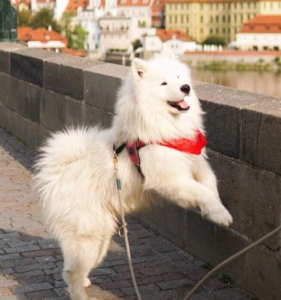Samoyed Dog Breed: A Comprehensive Guide
The Samoyed is a medium-sized, white Arctic Spitz dog. They are known for their thick, fluffy fur, curled tails, and friendly disposition. Samoyeds were initially bred as working dogs by the Samoyed people of Siberia, and they were used for herding reindeer, pulling sleds, and guarding camps. Today, Samoyeds are popular companion dogs all over the world.
Appearance
Samoyeds are medium-sized dogs, with males typically weighing between 50 and 60 pounds and females weighing between 40 and 50 pounds. They have a thick, double coat of white fur, with an outer coat that is long and rough and an undercoat that is soft and dense. Samoyeds also have a curled tail, which they often carry over their backs.
Temperament
Samoyeds are known for their friendly and outgoing personalities. They are typically good with children and other pets and make great family dogs. Samoyeds are also intelligent and energetic dogs that need plenty of exercise.
Care and Grooming
Samoyeds require regular grooming to keep their coats healthy and mat-free. They should be brushed at least once a week, and they should be bathed every few months. Samoyeds also need to have their nails trimmed regularly.
Training
Samoyeds are intelligent dogs, and they are relatively easy to train. However, they can also be stubborn at times, so it is essential to be consistent with their training. Samoyeds respond best to positive reinforcement, such as praise and treats.
Health
Samoyeds are generally healthy dogs but are prone to certain health conditions, such as hip dysplasia, elbow dysplasia, and eye problems. It is essential to have your Samoyed screened for these conditions by a veterinarian.
Lifespan
Samoyeds have a lifespan of 12 to 14 years.
Activity Level
Samoyeds are energetic dogs, and they need plenty of exercise. They should be taken for at least one long walk or run daily. Samoyeds also enjoy playing fetch and other active games.
Diet
Samoyeds should be fed a high-quality diet appropriate for their age and activity level. They should not be overfed, which can lead to obesity and other health problems.
Common Health Conditions
Samoyeds are generally healthy dogs, but they are prone to certain health conditions, such as:
- Hip dysplasia is a condition in which the hip joints do not develop properly. It can lead to pain and lameness.
- Elbow dysplasia: This is a condition in which the elbow joints do not develop properly. It can lead to pain and lameness.
- Eye problems: Samoyeds are prone to several eye problems, including cataracts, glaucoma, and retinal atrophy.
- Hypothyroidism is a condition in which the thyroid gland does not produce enough thyroid hormone. It can lead to various symptoms, including weight gain, lethargy, and hair loss.
- Progressive renal atrophy is a chronic kidney disease that can lead to kidney failure.
Grooming
Samoyeds require regular grooming to keep their coats healthy and mat-free. They should be brushed at least once a week, and they should be bathed every few months. Samoyeds also need to have their nails trimmed regularly.
Brushing
Samoyeds have a thick, double coat of fur, so it is essential to brush them regularly to prevent mats and tangles. Use a slicker brush to remove loose hair and mats, then a pin brush to smooth the coat.
Bathing
Samoyeds do not need to be bathed often, as their fur is self-cleaning. However, they should be cleaned every few months or more often if they get dirty. Use a mild shampoo and conditioner that is specifically designed for dogs.
Nail Trimming
Samoyeds’ nails increase, so it is essential to trim them regularly. Use a pair of dog nail trimmers to trim the nails to a length where they touch the ground.
Exercise
Samoyeds are energetic dogs, and they need plenty of exercise. They should be taken for at least one long walk or run daily. Samoyeds also enjoy playing fetch and other active games.
Training
Samoyeds are intelligent dogs, and they are relatively easy to train. However, they can also be stubborn at times, so it is essential to be consistent with their training. Samoyeds respond best to positive reinforcement, such as praise and treats.
Socialization
Socialization is the process of exposing your puppy to new people, places, and experiences in a positive way. It helps your puppy learn what to expect from the world and how to behave in different situations.
Socialization is crucial for Samoyeds, as they are a working breed that was initially bred to be sled dogs. This means that they have a solid need to be around people and other dogs.
A Samoyed needs to be properly socialized to avoid becoming fearful or aggressive towards people or other dogs. They may also develop other behavioral problems, such as separation anxiety or excessive barking.
Why is socialization important for Samoyeds?
Socialization has many benefits for Samoyeds, including:
- It helps them learn to be comfortable around new people, places, and experiences.
- It reduces their fear and anxiety.
- It helps them develop good social skills and learn how to interact with other dogs and people positively.
- It prevents behavioral problems, such as aggression, separation anxiety, and excessive barking.
- It makes them more confident and well-adjusted adults.
How to socialize your Samoyed puppy
There are many ways to socialize your Samoyed puppy, including:
-
Enroll in puppy socialization classes.
Puppy socialization classes are a great way to expose your puppy to new people, places, and other dogs in a safe and controlled environment.
Take your puppy to different places.
This could include parks, pet stores, or even other parts of your neighborhood.
Introduce your puppy to new people
Ask friends and family members to meet your puppy, and take them to places where they will encounter different types of people, such as children, men, and people with disabilities.
Introduce your puppy to other dogs.
This could be done at puppy socialization classes, dog parks, or on walks.
It’s important to socialize with your puppy positively. This means avoiding situations that could be scary or overwhelming for them. If your puppy seems scared or anxious, remove them from the situation and try again later.
Here are some tips for socializing your Samoyed puppy:
- Start early. The earlier you start socializing your puppy, the better.
- Be patient. Socialization takes time. It’s essential to be patient and consistent with your puppy.
- Make it fun. Socialization should be a positive experience for your puppy. Use treats and praise to reward them for good behavior.
- Please don’t force it. If your puppy is scared or anxious, don’t force them to interact with other people or dogs. Remove them from the situation and try again later.



